This incredible guide to the C2 Proficiency (CPE) speaking test was written by Helen Ingram, who has many years of teaching and examining experience, and it features audio from a few of her talented former students.
It's mind-blowing how much work Helen put into this so I hope you guys appreciate her effort!
Introduction
So, your CPE Speaking Exam is looming and the number of peaceful nights' sleep is dwindling .... but never fear, we're here to help!
1. What does the CPE Speaking Test look like?
You will take the CPE Speaking Test with 1 or 2 other candidates - if you are part of a trio the exam will be longer to compensate for the extra speaker. Like the other Cambridge Main Suite exams, there will be 2 examiners: the Interlocutor (sitting opposite you and asking the questions); and the Examiner (sitting to one side).
There are 3 sections to the CPE Speaking Test, and each section is designed to test different skills with different tasks and interaction patterns. Everything is explained in more detail below along with plenty of hints and advice.
2. How is it marked?
Both the Interlocutor and the Examiner will grade you, although the lion's share of the grade will come from the Examiner. They will be grading you according to 5 different categories. Let's take a look at them and see what you need to do to pass the CPE Speaking Exam.
| Criteria | A.K.A. | What it means |
|---|---|---|
| Grammatical Resource | Range & accuracy of grammar | The CPE exam requires you to have excellent control of basic grammatical structures, which would include things like simple and continuous future tenses, past and present tenses, 1st and 2nd conditionals. It also requires you to demonstrate that you can use a number of sophisticated grammatical structures, things like inversion, 3rd conditionals, clefting and reduced relative clauses. The main focus is on the flexible and appropriate use of English in all parts. |
| Lexical Resource | Range & accuracy of vocabulary | CPE vocabulary should sound natural, like that of a native speaker, and should be relevant to the topic - for example a "ski instructor", not a "ski teacher". More than that, it should include a range of phrasal verbs, idioms and expressions to demonstrate familiarity and comfort with the language. |
| Discourse Management | Fluency & structure | Speech should be fluent and natural, with good structure to answers. The idea is that weaker speakers have to focus so much on their English skills that they are unable to respond concisely, succinctly or clearly; therefore by giving a well-structured response you demonstrate that you are comfortable enough with the language itself to focus more on the content. |
| Pronunciation | How you sound | This should be intelligible at all times, and as natural as possible. It relies upon accuracy at all levels: individual sounds; word stress; and sentence stress/intonation. Wherever possible, pronunciation should enhance and convey meaning to stress certain ideas or express certain emotions. |
| Interactive Communication | Collaboration & team-work | Discussed in more detail in Part 2 section |
3. FAQs
"Can I make mistakes and still pass CPE Speaking?"
The answer, of course, is YES: it is perfectly possible to make some mistakes on your Speaking Test and still be awarded a PASS.
However, it's very important to stress that it does depend very much on frequency of the mistakes, and on where and when the mistakes happen. For example, to make a mistake using the Present Continuous tense will be considered much more problematic than a mistake using Inversion, or another sophisticated form.
Likewise, a whole string of mistakes might signal to the examiner that you are either unaware that you've made them, or that you don't know how to correct them.
"If I make a mistake, should I correct it?"
Again, the answer is definitely YES. By leaving the mistake uncorrected the examiner is unsure if this is a 'slip' (something you know but momentarily forgot) or an 'error' (a mistake you don't understand or don't know how to correct).
Obviously, the ideal scenario is not to make the mistake, but if it does happen just calmly correct it and carry on.
"Can I have an accent from my native country and still pass?"
Let's just say this now: there's absolutely no need to try and adopt a fake Cockney accent for your CPE exam! The main focus points should be: intelligibility; flexibility; and consistency.
With the rise of globalised English the boundaries between what is "native" and "non-native" accents are well and truly blurred, and accent is not even mentioned anywhere on the marking criteria.
If your accent causes problems in understanding (mixing up 'v' and 'w', or an inability to make the 'th' sound) then it might need some work, but otherwise you should focus more on being consistent and flexible.
"The University of Cambridge is in the UK - will I lose marks for speaking American English?"
Of course not! As long as the vocabulary you're using is standard, accepted American English then you won't be marked down for it.
Consistency is also key, so avoid swinging wildly between American and British accents and dialects.
"Should I avoid slang in the Speaking Test?"
Not at all: slang is a key feature of the way that native speakers communicate with each other, so for the purposes of the CPE Speaking Test it's a great way of demonstrating familiarity.
(As long as it's appropriate - "Yo, what's poppin' homeslice?" probably isn't the best way to start your exam ...)
Phrasal verbs can be impressive when used well - check out a free sample of Andrew’s phrasal verbs course here.
"Which CPE coursebook should I buy?"
Andrew recommends Objective Proficiency while Helen prefers Expert Proficiency:
4. How should I start to prepare?
Start by watching this official Cambridge video:
You'll see a couple of students take the test. They do a pretty good job, but with the tips on this website, they would have done even better! After you're listening, take a look at the examiner's comments that you can find using this link.
Next, sign up for Grammarly (free) and iTalki ($10 buys you 20) so you can practice everything you learn here.
Here are some articles on this site that are about CPE:
Now move on to the first part of this CPE Speaking Test guide, where we give tips for the Interview section.
Part One - The Interview
(approx. 2 minutes for pairs / 4 minutes for trios)
Part 1 is known as the 'Interview', and consists of some questions about your life. These questions will be asked individually to you and your partner, so there's no need to interact with the other candidate(s) too much - although you may if you wish.
The interview tests 'general interactional and social language'
1. Which questions to expect
Typical questions about your hometown, your home, your job, your hobbies, and your personality are all very common. However, unlike at lower levels, the CPE Speaking Test will sometimes require you to give your opinion (O) and speculate (S) a little in Part 1.
Generally the questions start about you and your personal life, then ask you to make opinions, then move into more speculative territory.
Here are a few you could prepare for:
• Are you working or studying at the moment?
• What do you enjoy most about the place where you're living now? (O)
• You said you're from X. What's the most interesting place for visitors to see there? (O)
• How difficult would it be for you to move away from the area you're living in now? (S)
• What, for you, is the most interesting aspect of learning English?* (O)
• How much time do you spend travelling every day?
• Do you think it's easy for people to find a good job nowadays? (O)
• In the future, do you see yourself living in your own country, or somewhere abroad? (S)
• Do you tend to get nervous, and if so, in what circumstances?
• Do fashions in music change rapidly in your country? (O)
• Do you think your personality has changed over the years? (O)
• What countries or other parts of your country have you travelled to?
• Is it common for people to leave the place you come from? (O/S)
• Can you tell us something about housing in your area? (O)
• How good are you at organising your time?
• How important is the internet to you?
• With more shopping being done over the internet, what future is there for ordinary stores? (S)
(*note how this is a slightly more advanced version of the CAE Part 1 question: "what do you enjoy most about learning English?")
2. THE RIGHT LENGTH OF ANSWER
Too short:
Q - Are you working or studying at the moment?
A - Both.
Hey, come on! This is the CPE Speaking Test! P means proficient, not pithy.
A bit better:
Q - Are you working or studying at the moment?
A - Both, actually - I'm working part-time while I study for CPE.
Okayyy, getting there ..... but are we really CPE level yet?
The right length:
Q - Are you working or studying at the moment?
A - Both - studying for CPE doesn't pay, sadly, so I've got to do something to bring home the bacon! I'm holding down a part-time job as a waitress while I slog away at the books, but it's not all bad.
(This is a good length and it sounds natural. It makes good use of expressions, topic-specific vocabulary and phrasal verbs, but without being overly long. Remember: Part 1 is a balance of saying enough that you give yourself a chance to use some natural-sounding vocabulary and grammar without "overdoing it" and babbling on!)
3. GIVING OPINIONS
Part 1 of the CPE Speaking test asks for opinions, but many candidates fall into the trap of using the same old language to do this, with every sentence starting with an "I think ....". Mix it up a bit! Even in Part 1 it's important to use every opportunity to sound like you know how to use English confidently and flexibly, and every little helps. So, instead of saying "I think ...", how about trying something like:
It's likely/unlikely that ....
I bet / You can bet that ....
I imagine that ....
The chances are that ....
There's no chance of ....
In all probability .....
My guess is that .....
I wouldn't be surprised if .....
It seems to me (that) ....
All things considered ....
To tell you the truth ....
Personally ....
To my mind .....
I reckon ....
As I see it ....
I'm inclined to think/believe that ....
In my opinion ..
I believe ...
I reckon ...
I suppose ...
For me ...
As I see it ...
It seems to me ...
As far as I can tell ...
I would say ...
As far as I'm concerned ....
4. KEYWORDS, NOT SPEECHES
The examiners don't want to hear a rehearsed speech - and trust me, they know one when they hear one! The point of the test is to see how well you cope in a spontaneous, real-life situation and, crucially, how natural you sound.
So, learn some CPE-level vocabulary that you can use for the types of questions you might be asked. Let's take another look at a few of those sample questions, shall we?
What do you enjoy most about the place where you're living now?
Describing Areas:
upbeat, leafy, suburban, sleepy, a cultural hotspot, vibrant, got a real buzz, family-friendly, secluded, brilliant nightlife, amenities, facilities, cosy, traditional, modern, just a stone's throw from the X
How much time do you spend travelling every day?
Describing Travelling:
(gruelling) commute, fellow commuters, daily grind, rush hour, congestion, traffic jams, exhausting, waste of time/money, poor/excellent public transport system, season tickets, invigorating, get some headspace, catch up on my Podcasts/TV shows
Do you think it's easy for people to find a good job nowadays?
Describing Jobs:
job market, labour pool, high/low salary, relevant (work) experience, qualifications, interview techniques, major corporations, climb the corporate ladder, start on the bottom rung, paid/unpaid internship
Now you can try this with the other questions listed above!
5. Get a Better Grade - Without Speaking!
As the interaction chart above shows, in this part of the test you don't have to talk to the other student, but that's no reason to 'switch off'.
Many candidates stare at the desk, or at their hands, or worse still they stare intently at the examiner (creepy). Even if you're not verbally interacting with the other candidate(s), you should still look at them and listen to what they're saying.
Try to nod and smile and look interested - no matter how nervous you are! Examiners are only human after all (no, really, it's true), and they respond just as well to body language and facial expressions as anyone, so use yours to look positive and confident and it might just make the difference to your grade.
Crazy? Not really. There's a lot of research into body language, but let's do a quick, unscientific test.
Look at the above photo. Who looks stressed, struggling to understand? Who looks confident and in control?
Part Two - Collaborative Task
(approx. 4 minutes for pairs / 6 minutes for trios)
Ok, so here's where CPE starts to look very different to CAE and FCE.
In Part 2 of the Cambridge English: Proficiency test, you and your partner(s) are given a number of photos (4 or 5) on a common theme.
For the first activity, the examiner will select 2 or 3 photos and give you a question to discuss together for 1 minute (2 minutes for trios).
After that the examiner will give you a 3-minute (4-minute for trios) task using ALL of the photos which will involve discussing
and then either: selecting 1 for a particular purpose; or thinking of something else that could be added to the collection.
This is a collaborative task, so it will require you to work together closely with your partner.
What does it test?
- sustaining an interaction
- exchanging ideas
- expressing and justifying opinions
- agreeing/disagreeing
- suggesting
- speculating
- evaluating
- reaching a decision through negotiation
Let's Look at An Example!
“Here are some pictures of different aspects of the modern food industry.”
First, I'd like you to look at picture B and C and talk together about which picture interests you more.
Now look at all the pictures.
I'd like you to imagine that a magazine is planning an article on aspects of the modern food industry. These pictures will be used to accompany the article.
Talk together about the positive and negative aspects of the modern food industry as shown in these photos.
Then suggest: 1. one other aspect that could be included in the article, or 2. which aspect would be most suitable for the cover image.
(NB. In the exam there will be only 1 question in the second part - we have included 2 here to show the different types of question you are likely to be asked)
Now that you know what the task looks like, let's get into the tips.
1. What Exactly Is Collaboration?
Collaboration, also known as 'Interactive Communication' on the marking criteria, means team work. Let's look at what the examiners are listening for:
| 1 (C1 Level) | 3 (C2 Pass) | 5 (C2 superstar) |
|---|---|---|
| Initiates and responds appropriately, linking contributions to those of other speakers. | Interacts with ease, linking contributions to those of other speakers. | Interacts with ease by skilfully interweaving his/her contributions into the conversation. |
| Maintains and develops the interaction and negotiates towards an outcome. | Widens the scope of the interaction and negotiates towards an outcome. | Widens the scope of the interaction and develops it fully and effectively towards a negotiated outcome. |
Ok Cambridge, so that's some fancy language right there, but what on earth does it mean in practice? Well, let's unpack it:
| What Cambridge Want | Translation for Normal People |
|---|---|
| Level 1 | |
| initiates and responds appropriately | asking and answering questions where required |
| linking contributions to those of other speakers |
building on partner's response, not just saying 'yes' or 'no' |
| maintains and develops the interaction | requires no prompting to give opinions and agree/disagree |
| negotiates towards an outcome | attempts to persuade partner with arguments or evidence |
| Level 3 | |
| interacts with ease | looks comfortable and capable while asking or answering |
| widens the scope of the interaction | introduces new ideas or opinions to agree or disagree |
| Level 5 | |
| skilfully interweaving his/her contributions into the conversation |
totally at ease with the language, building responses and asking appropriate insightful questions, referring back to things previously mentioned |
| develops it fully and effectively towards a negotiated outcome |
providing ample appropriate evidence or reasoning for suggested ideas, sounding persuasive and effective in negotiation |
You can see the incremental changes building towards the maximum score of 5. The introduction of "widening the scope of the interaction" marks the really big difference between CAE and CPE.
You can think of it like this: at CAE level you're already very good, but you're still concentrating on your English, which means you're not 100% natural with your use of the language and you mainly stick to what's in front of you.
At CPE level, however, you're so comfortable with your use of the English language that you can move beyond what's in front of you in whichever direction you like, adding new ideas and broadening the topic to allow proper discussion and debate.
2. What Does CPE-Level Collaboration Sound Like?
We've already mentioned that saying "I think ..." all the time to give opinions isn't going to cut the mustard, and the same is true of collaboration: just saying "I agree" or "I disagree" won't score you the points. How about trying some of these on for size:
| AGREE |
DISAGREE |
PARTIALLY AGREE |
|---|---|---|
| We see eye to eye | We don’t see eye to eye | I take your point, but let's think of ... |
| I couldn’t agree with you more. | I tend to disagree with you there | That's interesting, but have you considered ...? |
| That’s exactly how I feel. | I’m afraid I have to disagree with you there | True, but I think there are other points/aspects/opinions to bear in mind. |
| You have a point there. | I beg to differ | Yes, but if we looked at it from another angle ... |
| I was just going to say that. | That’s not always the case. | OK, but what about ...? |
| Absolutely. | That's not exactly how I look at it. | |
| I'd go along with that. |
I'm afraid I just don't buy it! | |
| On second thoughts, I have to agree with you. | ||
| That seems reasonable. |
3. What If My Partner Doesn't Want to Play Ball?
We've seen how important 'Interactive Communication' is to the CPE speaking test grade, and taking the test with 1 or 2 other candidates can be a great thing: you've got someone to divert some of the focus away from you, someone to bounce ideas off - even someone to pass difficult questions on to!
However, it can also be a source of great worry to many candidates if they don't know who their partner is going to be. If you're currently fretting about this - you're not alone!
The first thing to know is that you can choose your partner! If you know someone else who is planning on taking CPE in your area then you can register together and list them as your speaking partner. It won't affect your grade, but it might make you feel more comfortable in the exam.
If you don't know anyone else taking it, all you need to know that is that the only person who affects your grade is YOU. The Cambridge examiners are very well-trained with lots of experience, and they will understand whatever situation you find yourself in. There are a few things you can do to help ease your nerves, however, if you end up with a partner who isn't everything you hoped for ....
NERVOUS/SHY PARTNERS
We can all imagine the scenario: you give your two cents on the issue succinctly and concisely, ask a thought-provoking question to your partner, smugly sit back and wait for their response ..... which never comes. How awkward. It can be a challenge dealing with a shy/nervous partner who doesn't say much, but the good news is that you don't need to worry about it affecting your marks.
As we looked at, CPE-level collaboration involves you "interacting with ease" and "widening the scope of the interaction", both of which are perfectly possible with only the bare minimum of response from your partner
Make sure you give your partner the CHANCE to speak, it's entirely up to them if they take it or not
Ask them lots of questions, introduce some of your own ideas, and try to comment on/respond to what they say (if anything) wherever possible: this will give you more than enough to score 3+!
WEAK PARTNERS
The reality is that not everyone who takes exams is truly prepared for them, and it may be that you end up paired with a candidate who is not quite C2 level. Don't panic, there's absolutely no way that their performance can affect your grade!
Allow them to have their say as per usual, and then focus on your own answers.
Don't feel that you need to correct their mistakes just to prove that you know the right answer - the examiners are listening to your grammar and vocabulary as individuals, not as a team.
(And try and be nice, too - if they're struggling, step in and offer to help, but bear in mind that they're almost certainly just as nervous as you are, so try not to make them feel worse!)
DOMINEERING PARTNERS
This is probably the trickiest one to deal with, and it's quite a common occurrence!
You only need to know 2 things about this, if it happens: firstly, your partner will lose points for dominating the discussion, but you won't if you've made an attempt to contribute; secondly, the Interlocutor is trained to try and 'steer' the exam to allow balanced speaking time for both candidates.
This means that if your partner has dominated in one part of the test, the Interlocutor will direct more questions to you in the next part, so you don't need to panic.
Allow them to have their say as per usual, but if you feel that they are dominating the discussion you can try and interject (politely!) Here are some phrases you might like to try:
Sorry to stop you, but ...
Is it okay if I jump in for a second?
If I might add something...
Can I throw my two cents in?
Sorry to interrupt, but...
Would you mind if I jumped in with an idea?
Can I add something here?
Could I make a suggestion?
If I could put a word in here ...
Similarly, if they insist in on interrupting you, try one of these (politely!):
Do you mind if I just finish my point?
Sorry, I hadn't quite finished!
Actually, I'd just like to finish with ...
Sorry, just to come back to the point I was making ...
Most candidates who dominate are just nervous and don't even realise that they're doing it! If you keep calm, stay friendly, and use one of the phrases above you'll almost certainly find that the interaction pattern between you improves.
4. Common Mistakes
Monologues (try not to talk more than 20/25 seconds without passing the ball to your partner - especially if you've taken the initiative and started the interaction)
Not reacting to your partner's ideas with enough detail or ideas
Dead air - looking expectantly at the Interlocutor after 30 seconds or asking "do we have more time?"
Nodding and other non-verbal communication (socially normal, but this is a speaking test. At least say 'yes' while you are nodding!)
Discussing too many pictures, or the wrong pictures, in the first activity
Describing the photos instead of speculating and going beyond
Not completing both parts of the task in the second activity (discussing and making a decision/adding something new)
5. Hints And Tips
Listen carefully to the instructions and make sure you stick to the task
Use ALL the time available and keep talking until the Interlocutor stops you
If you forget what the task it, ask for clarification! Far better to ask the Interlocutor or your partner to repeat it to you than to waste your time going off-topic
Take notice of the title on the photo sheet the Interlocutor gives you for the second activity - if you forget the task or think you might have gone 'off-track' a bit, just read it to remind yourself and stay focused.
Don't just acknowledge your partner's points, build on them with new ideas - negotiation isn't only about disagreeing, you can agree in a constructive way too
Use a variety of functional language for agreeing, disagreeing, persuading and negotiating (see earlier section on collaboration)
Part Three - Long Turn
(approx. 4 minutes for pairs / 6 minutes for trios)
And finally, on to the part that makes every candidate's knees shake: the 2-minute Long Turn! You don't need to fear, however, because we're here to help!
In Part 3 of the Cambridge English: Proficiency test each candidate is given a card with a question written on it, along with 3 ideas. The task involves answering the question on the card for 2 minutes, although the additional prompts on the card are optional. Don't forget that you will be asked a follow-up question about your partner's card, and will also be asked to comment on your partner's response to yours - so don't 'switch off'!
What does it test?
organising a longer speech
expressing and justifying opinions
developing topics
1. Common Mistakes
Panicking!
Talking about the general topic rather than answering the specific question
Repeating information and ideas
Repeating vocabulary
Not using any linking words or devices
Long pauses and fillers like "errrrrrrrr"
Speaking in a monotone
Not developing the ideas sufficiently with examples or reasons
Not using all the time available
2. Hints And Tips
You can have up to 10 seconds to think before you need to start speaking - use it!
Remember: you don't need to use the ideas on the card if you don't want to - they're just there to help in case you need a flash of inspiration.
Practise quickly brainstorming ideas on key topics/areas before the exam.
Focus on the construction of your answer, i.e. avoid "mind vomit" or "here's everything I know about X in 2 minutes" - structure is very important, so think about including an 'introduction', 'main points' and a 'summary', just like in writing.
3. The Golden Rule
Practice makes perfect! Oh, such a cliché - but so true. Candidates always struggle to produce satisfactory answers the first few times, and why wouldn't they? It's testing so many things! So, the real key to this task is practice, practice, practice ....
4. See (Hear!) How It's Done
Listen to some students having a go at the following CPE Long Turn tasks. While you're listening, try making some notes about their performance in the following areas using the explanations from earlier: grammar; vocabulary; discourse management; and pronunciation.
“What makes people work more effectively?
o rules
o rewards
o other people”
NB. This was Anna's first EVER attempt at a CPE Long Turn!
“What are some common problems that people can encounter while travelling?
o documents
o transport
o accommodation”
“What do people gain from travel?
o personal
o culture
o personality”
“How can city transport be made to work better?
o investment
o staffing
o organisation”
NB. Anna passed CPE with a very high Pass B - only 1 point from a Pass A!
Now click the following link to read Helen's feedback for these students.
5. FAQs
"Is it bad to pause during the Long Turn?"
In theory, absolutely NOT. "Fluency" doesn't mean "not stopping" - remember, CPE is all about sounding natural, and native speakers pause all the time! The examiners will know the difference between a pause to think and a pause because you don't know how to say something in English, so don't worry, and they also make certain allowances for nerves - they know how much pressure you're under, and are trained so as not to penalise really nervous candidates. However, it's best to try and avoid lots of fillers like "errrrrrr" and "ummmmm" - recording yourself speaking and listening back to it is a great way to spot if you're doing this (although very cringeworthy, we know ...).
"Will I lose points if I don't cover all the bullet points on the card?"
The answer is NO. The 3 ideas on the card are there to give you inspiration if you need it; you don't actually have to use any of them if you don't want to. The focus should be on providing a clear, well-structured response to the question given. The points can be very useful, however, for helping you to structure your answer, so unless you're feeling super confident about the task and the topic given, we recommend you consider using them!
"Is it bad if the Interlocutor stops me mid-sentence?"
Not at all! This means that you've used all the time given, which is a great idea. However, as always, it's about QUALITY as well as quantity, so just make sure you're answering the question in a well-structured way with lots of juicy vocab when you get interrupted!
"Will I lose points if I don't speak for the full 2 minutes?"
You will be penalised if you stop well short of the 2-minute mark, i.e. more than 10 seconds before. However, it's essential to remember that this is only 1 part of the CPE Speaking Test, so if this happens the important thing is not to panic or let it affect your performance in the final part: it's a very small part of the mark overall and won't affect your grade if you perform well in the other parts of the test.
"How can I prepare for the Long Turn?"
It's not a very 'natural' task, let's be honest, so the only way you can really prepare is by doing it. Practise brainstorming ideas quickly on certain topics, and record yourself speaking for 2 minutes to evaluate your performance. If you can, find yourself a teacher with Cambridge experience to give you some hints and tips on areas for you to improve.
6. Try Your Hand
So, now you've read all about it and listened to some examples, it's your turn to have a go! Here are a couple more CPE Long Turn tasks, complete with follow-up questions. If it's your first time then try brainstorming ideas and vocabulary first before speaking - but no full sentences! If you're feeling really brave then why not try recording it too?!
“What effect has the internet had on the way we receive news and information?
o newspapers/TV/radio
o bias
o objectivity”
Do you think that newspapers continue to have a role in the modern world?
“Which do you prefer, a package holiday or independent travel?
o convenience
o cost
o freedom of choice”
Do you see the idea of holidays changing drastically in the future?
“What would you say are the main criteria for a healthy lifestyle?
o nutrition
o physical activity
o intellectual stimulation”
Would you say you have a reasonably balanced diet?
Part Three - Discussion
(approx. 6 minutes for pairs /8 minutes for trios)
Part 3 of the Cambridge English: Proficiency test ends with a number of more general questions related to the theme of the Long Turn questions and usually lasts around 6 minutes (8 for trios). The questions may be asked to a specific candidate or they may be left open for anyone to answer. You will be expected to comment on your partner's contributions in some way, so make sure you're paying attention!
What does it test?
- expressing and justifying opinions
- developing topics
- agreeing/disagreeing
1. Common Mistakes
Talking too personally instead of about the topic in a more abstract way
Not answering the question directly (for example, if the question is "Do you agree?" then you need to say either 'yes' or 'no' - in CPE-level language, of course!)
Not being able to comment on the other candidate's/candidates' contributions
Not developing responses sufficiently
Overdeveloping and dominating the discussion
2. Try Your Hand
The discussion questions always continue the theme of the Long Turn questions. For example, following the Long Turn questions 'What makes people work more effectively?' /'How can city transport be made to work more effectively?' there may follow questions on efficiency in general. Have a go at answering some of these questions:
In what ways do you think modern technology helps our world to function efficiently?
What personal skills do people need to make their lives run smoothly?
When things go wrong these days people often want financial compensation. Do you agree with this attitude?
They say that money makes the world go round. How much truth is there in this?
In what ways can the design of a building help people work better?
What group of people do you think contributes most to the society we live in today?
3. Answering the Question
Q. When things go wrong these days people often want financial compensation. Do you agree with this attitude?
A. Oh yeah, I read a story recently about a woman who spilled McDonald's hot coffee down herself and sued them for compensation.
The mad thing was, she'd bought the coffee and then tried to drive with it between her knees, and then when she braked it went everywhere! Apparently that's why they now have to print "CAUTION - HOT!" on all takeaway drinks now.
Ok, we love an anecdote as much as the next person - and the Stella Awards are hilarious - but the question asks if you AGREE with it or not, i.e. is it a good or a bad thing?
The vocabulary and grammar from this answer are spot on, but it needs another sentence evaluating the story and deciding if the decision to award the compensation was good or bad and why. Something like this ....
Q. When things go wrong these days people often want financial compensation. Do you agree with this attitude?
A. Oh yeah, I read a story recently about a woman who spilled McDonald's hot coffee down herself and sued them for compensation.
The mad thing was, she'd bought the coffee and then tried to drive with it between her knees, and then when she braked it went everywhere! I mean, how utterly crazy is it that a company should pay for this lady's stupidity - fancy trying to drive with boiling hot coffee balanced between your knees!
But I think that this is becoming an increasingly common attitude these days, that everyone wants something for nothing, you know? It's a shame, and I don't think it's right.
4. FAQs:
"Will I lose points if I say something the examiner doesn't agree with?"
Absolutely NOT! The examiners are there to assess your English, not your opinions. That being said, try to refrain from extremely polemic statements - a punch-up with your partner isn't the best way to end your exam!
"Does everything I say have to be true?"
Not really, no - the test is of your English not your General Knowledge, and the examiners have better things to do than go home and fact check everything you say! You can invent things if you wish, but be careful that it doesn't make you contradict yourself or get in a muddle.
"Will I lose points if I ask the examiner to repeat a question?"
Not at all - always ask for clarification if you need it so that you can make the most of your time answering.
CPE Speaking Test: General Tips
Vocabulary: Major Topic Areas
20% of your mark in the Cambridge CPE Speaking exam comes from your use of vocabulary, and here's what they have to say about it:
| Rating | 1 (C1 Level) |
3 (C2 Pass) |
5 (C2 Superstar) |
|---|---|---|---|
| Lexical Resource |
Uses a limited range of appropriate vocabulary to give and exchange views on familiar and unfamiliar topics. |
Uses a range of appropriate vocabulary with flexibility to give and exchange views on unfamiliar and abstract topics. |
Uses a wide range of appropriate vocabulary with flexibility to give and exchange views on unfamiliar and abstract topics. |
As you can see, to pass CPE (3+) the examiners are expecting flexible use of vocabulary to express your opinions about "unfamiliar and abstract topics", and it's your job to make sure that you're prepared for this.
Obviously, general things like phrasal verbs, idioms and expressions are all going to be really useful; but you will also need a good selection of topic-specific vocabulary to express yourself.
Take a look at these 10 frequently appearing topics to make sure that you'd feel comfortable talking about them - remember, you need to be able to talk about them in an "abstract" way, not just personally or relating to you!
Crime & Punishment
The Environment
Travel & Tourism
Food & The Food Industry
Family & Childhood
Science & Technology
Sport, Hobbies & Free-Time
Fashion, Clothing & Design
Health
Education
So, how can you get the vocab you need? .....
..... BUILD YOUR VOCABULARY
Now it's time to start adding high-level words to your 'active vocabulary' (as opposed to your 'passive vocabulary', i.e. words that you can recognise in context, but that you wouldn't use yourself).
That's something only you can do, but here are some website suggestions to get you started:
http://www.narrative.ly/ - Human Stories, Boldly Told
https://www.dezeen.com/ - Architecture and Design Magazine
https://www.jstor.org/ - Digital Library of Academic Journals, Books and Primary Sources
https://www.societyforscience.org/ - Science Magazine
(NB. All 4 also have newsletter subscriptions which send select articles and links to your inbox regularly - for FREE!)
You can also check out CNN, The Guardian, The Independent, FOX News, BBC and many other excellent news outlets for a variety of articles and videos - with the internet at your disposal the world is your oyster!
However, be careful - YOU have to start using these new words! That means saying them in conversations, writing them in emails, or even just writing short reviews/summaries of what you've read. It also means being prepared to make some mistakes: if you aren't making mistakes, you aren't learning.
Here's Andrew's video series about learning new vocab:
Speaking Test Self-Evaluation Sheet
AVOID REPEATING BORING / LOW-LEVEL VOCABULARY
So, we're all guilty of it, but sadly you won't get away with it in the CPE exam if you want to score highly. Your challenge, should you choose to accept it, is to banish the following words from your exam vocabulary:
good
bad
interesting
nice
important
Here are a few ideas to get you started on your road to CPE vocabulary heaven!

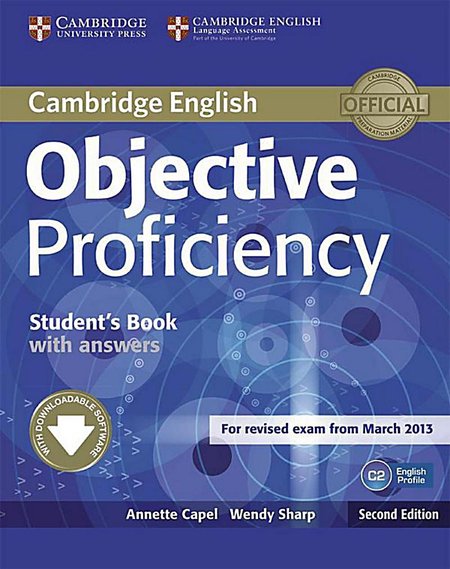

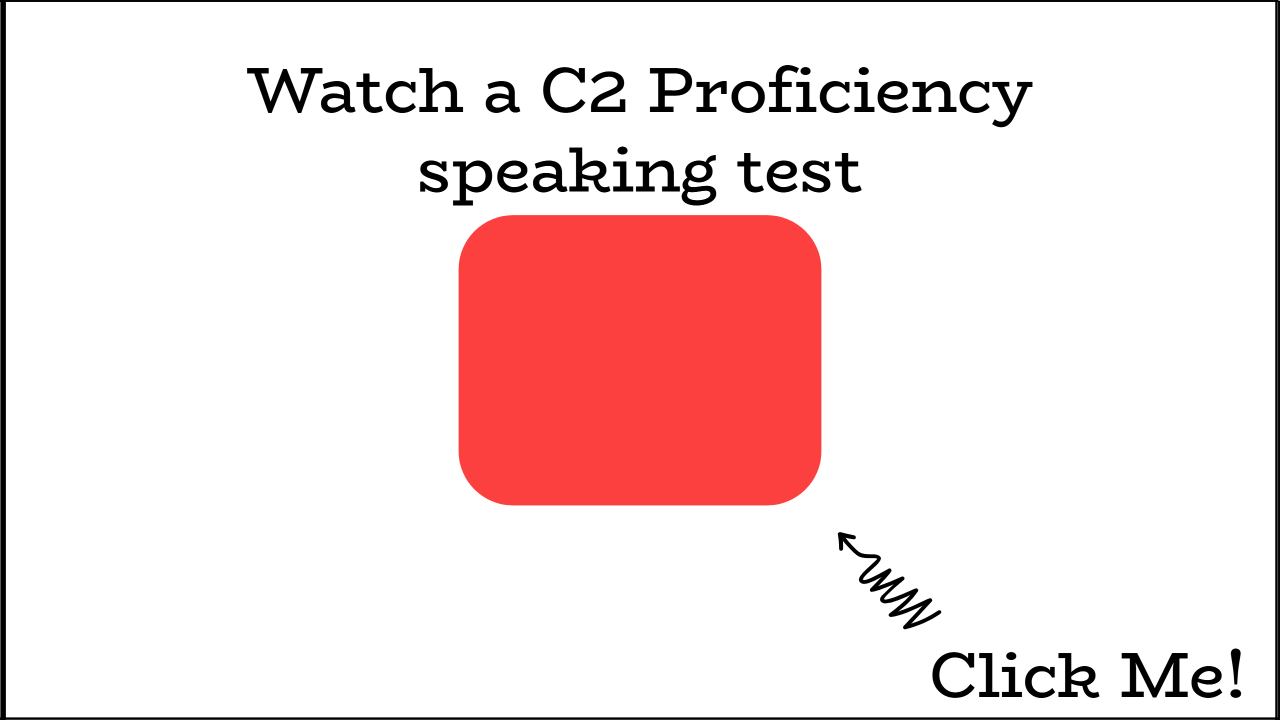


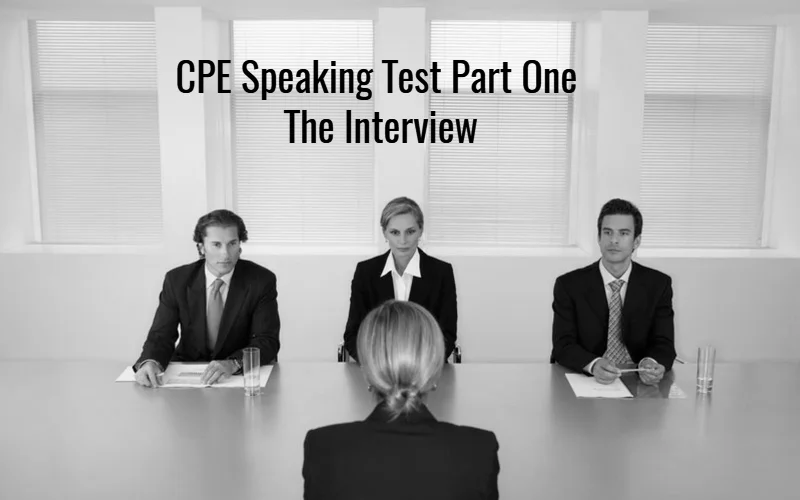
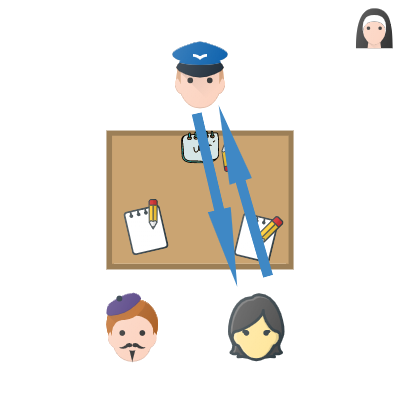

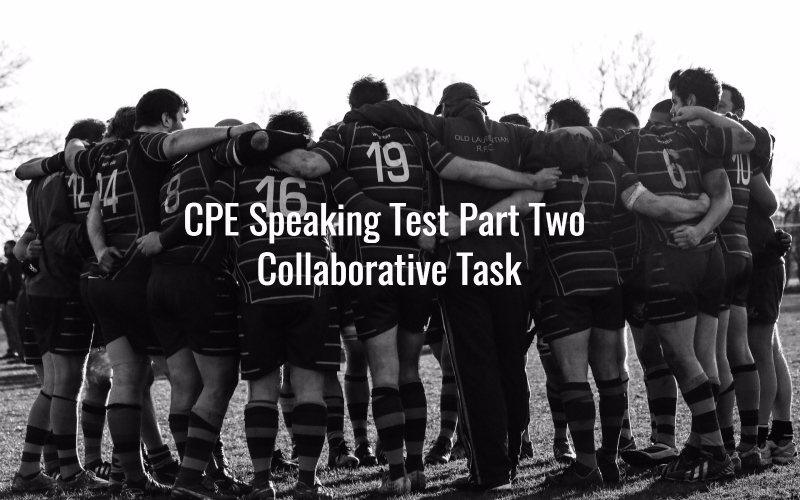









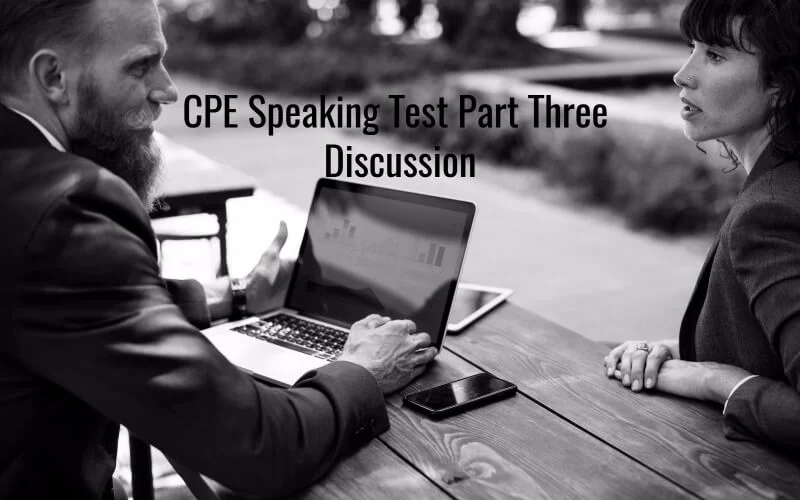



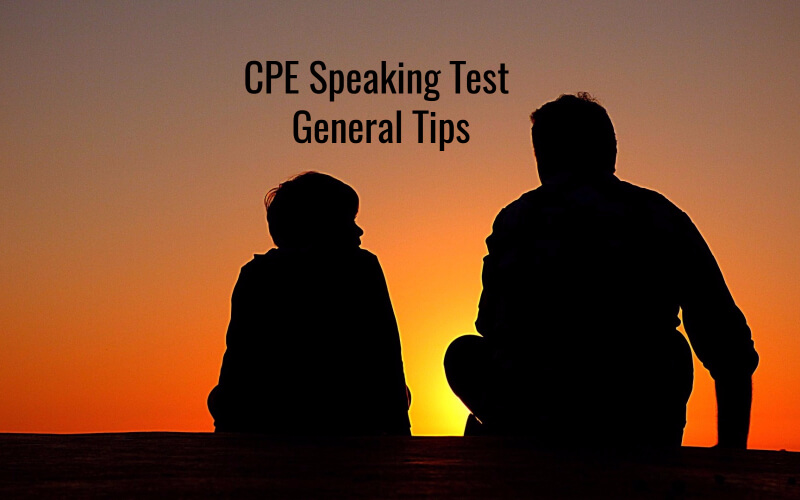


In this article we focus on four audio recordings from real-life CPE students, with detailed feedback and analysis from the experienced teacher and examiner Helen Ingram.